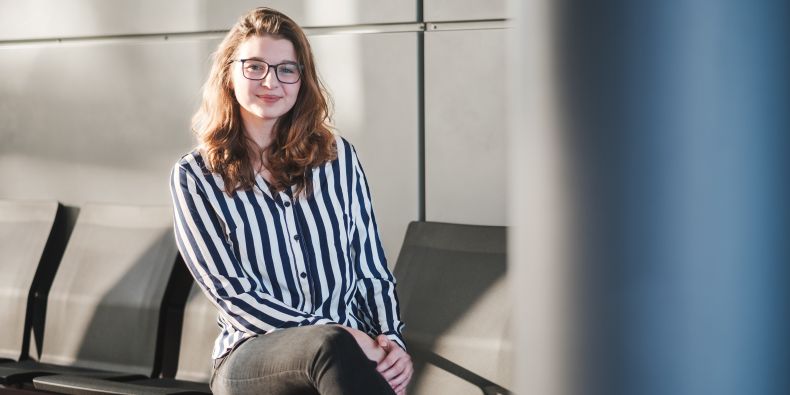“Our goal is to come up with a model originating in stem cells, which we refer to as induced pluripotent stem cells. Using small molecules referred to as signal molecules we attempt to reprogram the cells into Leydig cells which are responsible for the production of testosterone. Testosterone and other androgens have an irreplaceable role in processes related to male reproduction, as well as other processes. Chemicals present in the environment may disrupt the process of production of androgens. Once we have the newly programmed Leydig cells we will be able to test the effects of the environmental pollutants on male reproduction. Our cell model could very much replicate the actual processes in the human body, compared with other conventional methods, such as animal or rodent testing,” Řehůřková explains. She currently works at RECETOX where, for 40 years, scientists have studied environmental and health risks posed by chemicals around us.
“We are going to simulate the natural process of development, which will allow us to monitor the effects of chemical substances on the development of Leydig cells, and by extension, on the development of the cells in one period of formation,” Řehůřková says, adding that the Leydig cells formed are available without repeated contact with human donors. The cells can be replicated from original stem cells acquired through non-invasive methods from skin, blood or tissue.
“Generally, our goal is to come up with a functional and widely available model which will show us the effects of various chemicals and would allow for the testing of a great variety of substances,” Eliška Řehůřková comments on the goal of the project. “We hope that this model will eventually be used in the evaluation of various risks to male reproduction, in biomedicine or pharmaceutical studies and drug testing,” she says.
Following the completion of her master’s programme at the Faculty of Science, she joined the team of scientists at RECETOX, working as a lab technician. Through her work on the cell models she contributes to the activities of the entire research team Cell and tissue toxicology. In fact, research conducted by her supervisor Iva Sovadinová actually brought her to the focus on the substances affecting male reproduction.
“I have always loved nature. I was in a forest ranger club in junior high school, where they taught us to like and explore nature. This is where my love for nature comes from, which is why the Faculty of Science was a logical step. As was RECETOX and its activities in the area of the protection of the environment,” Řehůřková says, adding that she is happy about her choices. “RECETOX emphasises the importance of interdisciplinary work and familiarity with things happening around us. They do not want us just sitting in labs all the time. We are supposed to develop soft skills, such as external communication, project management and other tasks.”
The latter was a major asset for Eliška in the Ph.D. Talent competition. “It is amazing that I have succeeded, considering the competition, because all projects were interesting,” she commented on the fact that her project was one of the 25 successful ones among 150 contestants.
“The scholarship will allow me to focus entirely on my research and the improvement of the soft skills and interdisciplinary aspects. We enjoy the support from the university through the MUNI Mendelus Doctorandus programme, which helps me develop individual abilities as well as the research as such,” she explains.
Being born in South Moravia, Řehůřková considers Brno as a good place to live, study and do research, although she tries not to become attached too much. “We’ll see. Right now I am focusing on finishing my doctoral programme. Then I would like some experience abroad, but I would most definitely want to return to the Czech Republic, preferably Brno,” she concludes.
Brno supported over 200 young scientists
Founded in 2009, the scholarship programme Brno Ph.D. Talent supports selected students of life science, medicine and technical fields who receive three-year scholarship for the duration of their doctoral programme in the amount of CZK 330,000. The programme finances the City of Brno from its budget, while the contest is organised by Jihomoravské centrum pro mezinárodní mobilitu (South Moravian Centre for International Mobility – JCMM).
Recipients of the Brno Ph.D. Talent scholarship for 2023 from Masaryk University:
- Hana Faldynová – SCI MUNI; Study and prediction of protein solubility in biomedical and biotechnical research
- Thomas Fellmeth – CEITEC MU; Computational simulations of conformational changes of Tau protein and its fibrillation
- Kateřina Hrůzová – SCI MUNI; Data-based knowledge: Deep learning brings revolution in separation in proteomics
- Ema Huščavová – MED MUNI; Mechanical characterisation of cells and spheroids through the modification of selective plane illumination microscopy
- Péter Kacz – CEITEC; Role of long non-coding RNA in the regulation of BCR signalling in chronic lymphocytic leukaemia
- Jana Kružlicová – SCI MUNI; Evolutionary consequences of newly formed sex chromosomes in dicotyledons
- Lucie Nepovímová – CEITEC MU; In situ replication of enteroviruses
- Siarhei Paliavoi – SCI MUNI; Effects of homologous recombination of transcription
- Daniel Pluskal – SCI MUNI; Journey to sustainable autonomous bioluminescence systems
- Eliška Řehůřková – SCI MUNI; Advances in the reproductional toxicology in males with innovative in vitro models of testicular steroidogenesis
- Anna Řechtáčková – FI MUNI; Development of automatic methods for the teaching of code quality in initial programming
- Dorota Sklenárová – SCI MUNI; Nanoparticles with photon conversion for highly effective immunochemical tests
- Tereza Šošolíková – SCI MUNI; AGR2 in cancer: goal for overcoming resistance
- Haneen Tuaima – MED MUNI; Stem-cell niche heterogeneity in the development and regeneration of teeth
- David Zimčík – SCI MUNI; SATB2 as a key molecule in the control of developmental and pathological processes
